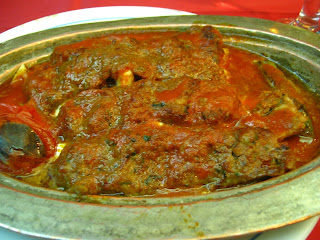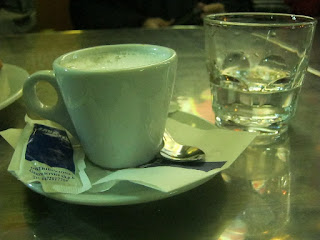Only 48 more hours.
That's what I have to keep reminding myself as I wait (somewhat) patiently for my 2:15AM flight from Dar Es Salaam, Tanzania to Cairo, Egypt. A quick jump over the small body of water some like to call the Atlantic to the city that never sleeps, the big apple, or in the words of Alicia Keys "NeW YOOOOOOOOORRRRK!" before heading back HOME.
Now it's time for reflection. I know I'm supposed to say something truly profound about my new perspective of the world and while, yes, I am changed, I'm sorry to disappoint but I just don't think I have it in me to produce any sort of profound statement quite yet. Why? Because I'm exhausted.
Please don't think that this statement is anyway a negative reflection on the past eight months. On the contrary, I am thrilled to be exhausted. Being exhausted means that for the past eight months I've been living. Everyday a new experience, a new adventure, something to do, somewhere to go, new people to meet, new things to see. It's been incredible.
Before this trip I was a happily devoted student. I put all my time and energy into my studies and I have no regrets (it's part of the reason I ended up on this trip in the first place). However, putting all of my energy into studying meant that my focus was narrow and self serving. I ended up missing out on what was happening in the world around me. To make up for lost time I dove into new cultures, new experiences, head first and sometimes without thinking. I will admit for the first few months I hesitated quite a bit. I played it safe and decided not to push myself. It was, after all, my first time out in to the big wide world and I'll be honest, I was afraid. Yes, you heard it straight from the source, the world and traveling in it alone scared me.
People often ask me if I've been afraid or nervous as a woman traveling alone. My initial reaction (my inner feminist) is determined to reply "HELL NO!" while the realist inside of me is screaming "YES, ALL THE TIME, YES!" I usually come up with a response that sounds like, "mehhmmm well, yes but no." It's frightening. I learned quickly to put my faith in the universe and I forced myself sometimes to see the best in the situation. Most often this involves seeing the humor in a terrible, or unfortunate event and just rolling with it. I am thankful for my sense of humor, without it I don't think I could have lasted eight months. I can't imagine how I would have reacted to the first meeting of the pigeon lady in Bangkok, being saved from an insane tuk-tuk driver, or being asked if I wanted to "make boom-boom" without it.
One thing I have done continuously for the past eight months is saying goodbye. It all started at the airport when I had to say goodby to my parents. My Dad thought he could go through security and was then reprimanded by a tiny, yet intimidating, security woman. In every country, every city, I've met fellow travelers or locals who would make life just a little less lonely for a short time. Then I had to say goodbye. I'm no good at good byes. I find them uncomfortable and never quite "complete." Yet here I am, ready for my final few hours of travel, and once again I'm finding it difficult to say good bye.
Good bye Tanzania, Good bye Africa, Good bye relaxation, Good bye travel, Good bye swim suit (I left it behind), Good bye sunscreen, Good bye chipati, Good bye buses (I won't miss you), Good bye to all the people I've met along the way (for some of you it's only a brief good bye, more of a "see ya later") and finally
HELLO HOME!
That's what I have to keep reminding myself as I wait (somewhat) patiently for my 2:15AM flight from Dar Es Salaam, Tanzania to Cairo, Egypt. A quick jump over the small body of water some like to call the Atlantic to the city that never sleeps, the big apple, or in the words of Alicia Keys "NeW YOOOOOOOOORRRRK!" before heading back HOME.
Now it's time for reflection. I know I'm supposed to say something truly profound about my new perspective of the world and while, yes, I am changed, I'm sorry to disappoint but I just don't think I have it in me to produce any sort of profound statement quite yet. Why? Because I'm exhausted.
Please don't think that this statement is anyway a negative reflection on the past eight months. On the contrary, I am thrilled to be exhausted. Being exhausted means that for the past eight months I've been living. Everyday a new experience, a new adventure, something to do, somewhere to go, new people to meet, new things to see. It's been incredible.
Before this trip I was a happily devoted student. I put all my time and energy into my studies and I have no regrets (it's part of the reason I ended up on this trip in the first place). However, putting all of my energy into studying meant that my focus was narrow and self serving. I ended up missing out on what was happening in the world around me. To make up for lost time I dove into new cultures, new experiences, head first and sometimes without thinking. I will admit for the first few months I hesitated quite a bit. I played it safe and decided not to push myself. It was, after all, my first time out in to the big wide world and I'll be honest, I was afraid. Yes, you heard it straight from the source, the world and traveling in it alone scared me.
People often ask me if I've been afraid or nervous as a woman traveling alone. My initial reaction (my inner feminist) is determined to reply "HELL NO!" while the realist inside of me is screaming "YES, ALL THE TIME, YES!" I usually come up with a response that sounds like, "mehhmmm well, yes but no." It's frightening. I learned quickly to put my faith in the universe and I forced myself sometimes to see the best in the situation. Most often this involves seeing the humor in a terrible, or unfortunate event and just rolling with it. I am thankful for my sense of humor, without it I don't think I could have lasted eight months. I can't imagine how I would have reacted to the first meeting of the pigeon lady in Bangkok, being saved from an insane tuk-tuk driver, or being asked if I wanted to "make boom-boom" without it.
One thing I have done continuously for the past eight months is saying goodbye. It all started at the airport when I had to say goodby to my parents. My Dad thought he could go through security and was then reprimanded by a tiny, yet intimidating, security woman. In every country, every city, I've met fellow travelers or locals who would make life just a little less lonely for a short time. Then I had to say goodbye. I'm no good at good byes. I find them uncomfortable and never quite "complete." Yet here I am, ready for my final few hours of travel, and once again I'm finding it difficult to say good bye.
Good bye Tanzania, Good bye Africa, Good bye relaxation, Good bye travel, Good bye swim suit (I left it behind), Good bye sunscreen, Good bye chipati, Good bye buses (I won't miss you), Good bye to all the people I've met along the way (for some of you it's only a brief good bye, more of a "see ya later") and finally
HELLO HOME!




















































